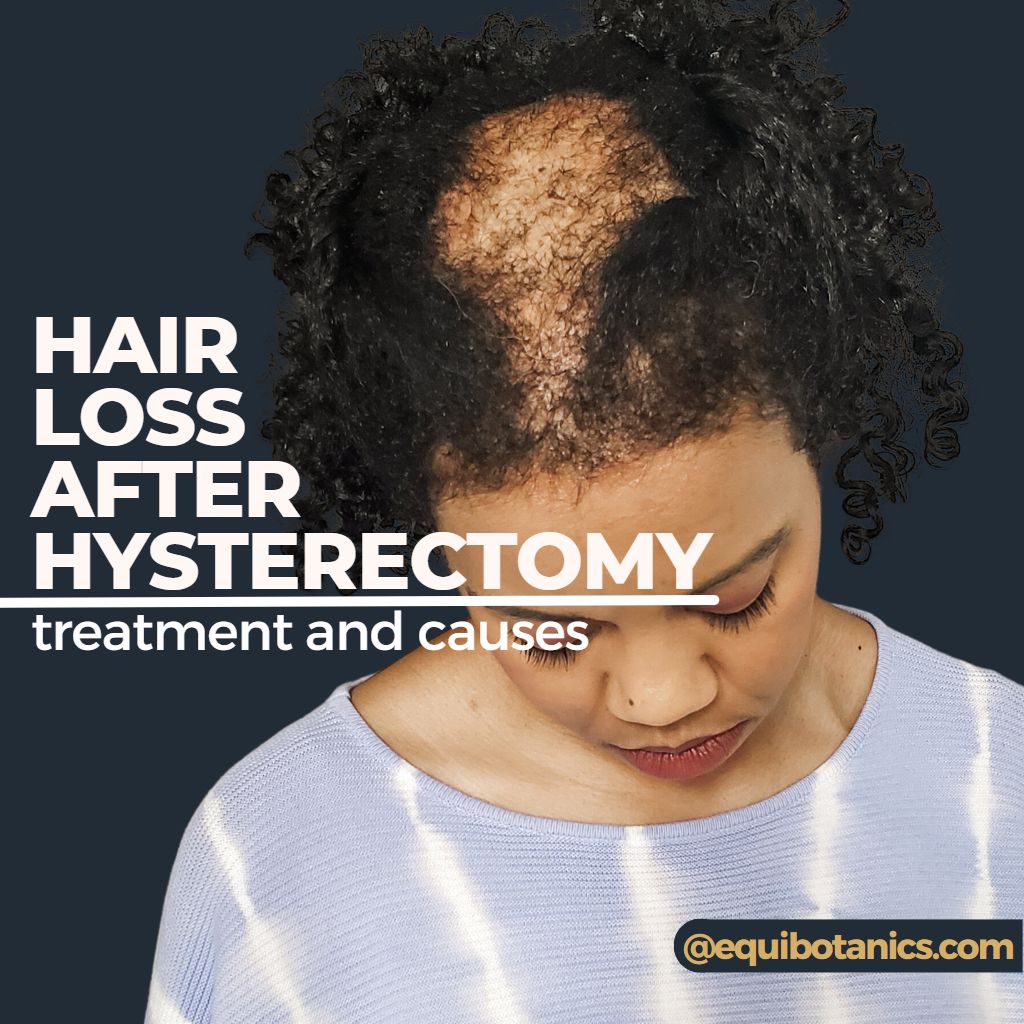
Undergoing a hysterectomy is a major procedure that’s relatively common in the UK, with around 1 in 5 women undergoing the surgery at some point in their lifetime.
As with all surgeries, a hysterectomy can occasionally lead to complications, such as infection. If the procedure is a total (or radical) hysterectomy, then this sees your ovaries removed, inducing the menopause as a result. This induced menopause causes a variety of symptoms, including hot flushes and an itchy scalp, but there are also longer lasting side effects such as high blood pressure and hair loss.
Sadly, a hysterectomy and hair loss go hand-in-hand. This common after-effect is normally caused by telogen effluvium (TE), a condition triggered by the stress of surgery on your body and disruption to your usual hair follicle cycle but can also be due to hormonal changes from the menopause.
The good news, though, is that hair loss after a hysterectomy is usually temporary. In this article, we’ll delve further into the causes and what you can do to treat it. First, though, what actually is a hysterectomy?
What is a Hysterectomy?

A hysterectomy is a major surgical procedure where a woman’s uterus is removed. There are two types of hysterectomy:
- Partial hysterectomy: this is where the uterus is removed.
- Radical hysterectomy: also known as a total hysterectomy, this procedure involves removing everything, including the uterus, cervix, ovaries and fallopian tubes.
Removal of the uterus during a hysterectomy means that women who have the surgery are no longer able to become pregnant and their periods stop.
Some reasons a woman would need a hysterectomy include:
The way in which a hysterectomy is performed depends on the type of surgery you have. There are 3 different ways the procedure is carried out:
- Laparoscopic hysterectomy – also known as keyhole surgery, this is the preferred way to perform a hysterectomy. A small tube containing a telescope and video camera are inserted through a small incision in your stomach to allow the surgeon to see your internal organs. Instruments are inserted through other small cuts in the abdomen or vagina to take away the womb, cervix and other parts of the reproductive system.
- Vaginal hysterectomy – this method sees the womb and cervix removed via an incision at the top of the vagina.
- Abdominal hysterectomy – this is where an incision is made in your abdomen, either horizontally along the bikini line or vertically from the belly button to bikini line.
Recovery from each of these surgeries will vary but if you have your ovaries removed, then you will go through the menopause after the hysterectomy.
Does a Hysterectomy Cause Hair Loss?

Unfortunately, like many surgical procedures, a hysterectomy can cause hair loss, as the body is placed under immense strain post-operation. Hair loss after ovary removal is particularly common as the body goes into menopause and the hormonal implications of this further add to the stress placed on your hair.
The menopause stops the body producing oestrogen and progesterone, and this is what halts menstruation. These hormones, however, are also important to hair health and growth. When these hormone levels drop during the menopause, it’s therefore likely to have an impact on your hair, too.
Some women may develop an increase in sensitivity to testosterone throughout this time which, in turn, can also cause hair loss. This is because testosterone can attach to the dermal papillae which regulates hair growth, as well as the androgen receptors at the base of your hair follicles, causing them to shrink.
Testosterone can develop into dihydrotestosterone (DHT) which also attaches to androgen receptors leading to androgenetic alopecia, commonly known as female pattern baldness.
How to Treat Hysterectomy Hair Loss
Thankfully, hair loss after a hysterectomy can be treated, and even reversed. It’s always advisable to seek medical advice if you notice hysterectomy hair loss. A doctor may recommend the following treatments:
- Spironolactone – a prescription medication used to treat acne, but it can help to deal with hair loss and thinning. It stops testosterone from changing in to DHT, preventing androgenetic alopecia, but can also halt and slow hair fall caused by the menopause.
- Minoxidil – topical minoxidil comes in two forms: a solution or a foam. This can be applied to a damp scalp and gently massaged in to increase blood and nutrient supplies to the hair follicles, strengthening hair and encouraging its growth.
There are also some lifestyle changes you can adopt to help with hair loss and promote growth, such as:
Use Conditioner

Conditioner is an essential part of your hair washing routine that will help to boost both strength and moisture levels with each wash. Invest in a high quality, naturally-derived product such as this Marula Leave In Conditioner to maximise results and stimulate that all important hair growth.
Eat a Balanced Diet

We all know how important it is to fuel our body with the right types of food, but it isn’t just our bodies that benefit, our hair does too! Foods rich in vitamins and nutrients such as omega 3, protein and vitamin D will help to support scalp health as well as improve growth and strength. Try to limit the amount of dairy and refined sugar you consume as this can negatively impact your hair and scalp health.
Introducing a specific hair supplement would also be beneficial to promote growth. Look for one that contains vitamin D, but also collagen. The production of collagen is slowed during the menopause, but it’s incredibly important in the building of hair proteins and the strengthening of tresses, so looking into a collagen supplement is no bad thing.
Use a Treatment

Regularly apply a topical hair treatment such as the Babassu Oil Treatment Hair Masque. This mask is a restorative, multi-tasker that works to heal and protect the scalp whilst at the same time intensely nourishing your hair and promoting its regrowth.
Consider further boosting your hair with the use of an oil to provide further hydration. Using oils such as argan, coconut, jojoba, or black seed can work to stimulate blood circulation, providing the scalp with essential nutrients needed for growth.
Lose the Heat

Where possible, allow your hair to air dry rather than applying heat styling tools; these can further damage your fragile, stressed tresses and scalp. If you feel you really do need to apply heat, then use the lowest setting and always apply a protectant beforehand.
Limit Hairstyles

Place your hair in protective hairstyles but avoid tight ponytails or buns as well as weaves and hair extensions. These styles can pull on your locks, placing your follicles under further strain. Keeping your hair wrapped up in a silk scarf overnight is also another top tip, as this helps to avoid friction and matting.
Frequently Asked Questions (FAQs)
“Is hair loss still possible after a hysterectomy if I kept my ovaries?”
If your ovaries aren’t removed during your hysterectomy procedure, then you may not suffer from hair loss. However, the stress of the procedure can still trigger hair to shed so it can’t be ruled out.
If your ovaries are not removed at the time, you won’t go into menopause immediately but you may still get symptoms earlier than usual including hot flushes, hair loss or dry, brittle hair after the hysterectomy.
“Is hair loss a side effect after anaesthesia?”
Yes, sudden hair loss is a common result of general anaesthesia because of telogen effluvium. Not all hysterectomy procedures are done under general anaesthetic, however, with some being performed under local anaesthetic, instead.
“Do you need oestrogen after a complete hysterectomy?”
If you have had both your uterus and ovaries removed, then oestrogen replacement therapy is usually required to reduce the risk of bone weakness later on in life.
“How long does hair loss last after a hysterectomy?”
Telogen effluvium, triggered by major surgery, tends to occur around 6-12 weeks after a hysterectomy and can last up to 6 months. Female pattern baldness (which can be caused by post-hysterectomy menopause) can last around 3-6 months. If incorrectly treated, however, it can unfortunately reoccur.
Conclusion
Hair loss after a major operation can be upsetting. The positive, though, is that this distressing occurrence can be treated and, in many instances, reversed. Seek advice as soon as you notice the first signs of hair loss to catch it early and adopt some lifestyle changes to further support your journey towards hair re-growth.


